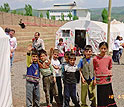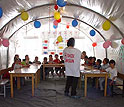|

Discovery
Earthquake Study Suggests Simple Building Fixes Can Save Lives

Code enforcement may have prevented dozens of deaths in Turkish temblor
October 13, 2005
While it is too early to know what, if anything, could have been done to prevent buildings from collapsing during the 2005 Kashmiri earthquake, a report released this past summer has shown that simple fixes could have saved lives during an earthquake in Bingol, Turkey, in 2003. An American-Turkish team of engineers said many of the 168 deaths could have been prevented had builders followed Turkey's existing structural codes.
Led by Purdue University civil engineering professors Julio Ramirez and Mete Sozen, the NSF-supported research team presented their findings at the 13th World Conference on Earthquake Engineering in 2004 and published their findings this past summer in the Canadian Association for Earthquake Engineering newsletter.
The researchers found that many of the failed buildings had "captive columns," slender, reinforced-concrete pillars that stand at the ends of shorter walls. The engineers consider the structures to be a "fundamental and classic" flaw--when a quake strikes, the portion of the column above the wall is unsupported and receives the full brunt of seismic forces.
After each column breaks, the building's weight is held by fewer and fewer of these pillars, resulting in a domino effect. Had supporting walls been present, the pillars would not have moved as violently from side to side, and the walls would have supported some of the overlying load. That simple fix could have prevented the collapse of the school buildings.
The researchers, sponsored by the National Science Foundation (NSF) and TUBITAK, the NSF counterpart in Turkey, made their report available to Turkish officials. The researchers hope their report on the damage from the 6.4 magnitude quake will help influence construction practices.
While relatively few building modifications would be needed to upgrade existing buildings, researchers fear that the same scenario could play out again in Turkey, the Caribbean, Latin America and elsewhere if officials do not enforce codes more strictly.
--Josh Chamot
Investigators
Mete Sozen
Julio Ramirez
Related Institutions/Organizations
TUBITAK
Purdue University
Locations
Purdue University
, Indiana
Related Programs
Structural Systems and Hazards Mitigation of Structures
Related Awards
#0334950 Preliminary Damage Assessment of the Bingol Earthquake
Total Grants
$28,202
Related Websites
Purdue University press release on Bingol disaster assessment: http://news.uns.purdue.edu/UNS/html4ever/2005/050913.Sozen.Bingol.html
Joint U.S.-Turkish earthquake-damage assessment for Bingol disaster: http://www.caee.uottawa.ca/13wcee_BingolpaperCAEE.pdf
TUBITAK: http://www.tubitak.gov.tr/english/index.htm
|





